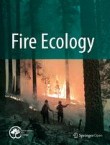Fire Ecology Chats
A Podcast Series by the Association for Fire Ecology
2023
Stabilizing influences on future wildfire regimes: Studies in forest burning and reburning
Edited by: Paul F. Hessburg, Lori D. Daniels, Nicholas Povak, Jocelyne Laflamme
First article published on: 30 June 2023
Remote Sensing for Wildfire Management Potential and Impacts
Edited by: Padam Jee Omar, Ganesh Ji Omar, Pankaj Kumar Gupta
First article published on: 17 February 2023
Fire Ecology Across Boundaries
Edited by: Anne Ganteaume, Núria Prat-Guitart, Guillermo Defossé
First article published on: 26 January 2023
Modeling Wildfire Under Climate Change
Edited by: Alex W. Dye, John B. Kim, Peng Gao, Larissa Yocom, Karin L. Riley
First article published on: 3 April 2023
2022
Wildland Fire Management Strategy and Effectiveness
Edited by: Erin J. Belval, Karen C. Short, Matthew P. Thompson, Jesse Young
First article published on: 4 August 2022
Life with Fire: Prescriptions for Resilience
Edited by: Morgan Varner, Sharon M. Hood, Núria Prat-Guitart, Kevin M. Robertson, Sarah M. McCaffrey
First article published: 10 July 2022
2021
Wildfire and Prescribed Fire Effects on Wildlife
Edited by: Gavin Jones, Brice Hanberry, Katie H. Greenberg, Angela M. White
First article published: 16 June 2021
Closed for submissons
Click here to view the full list of journal collections.
